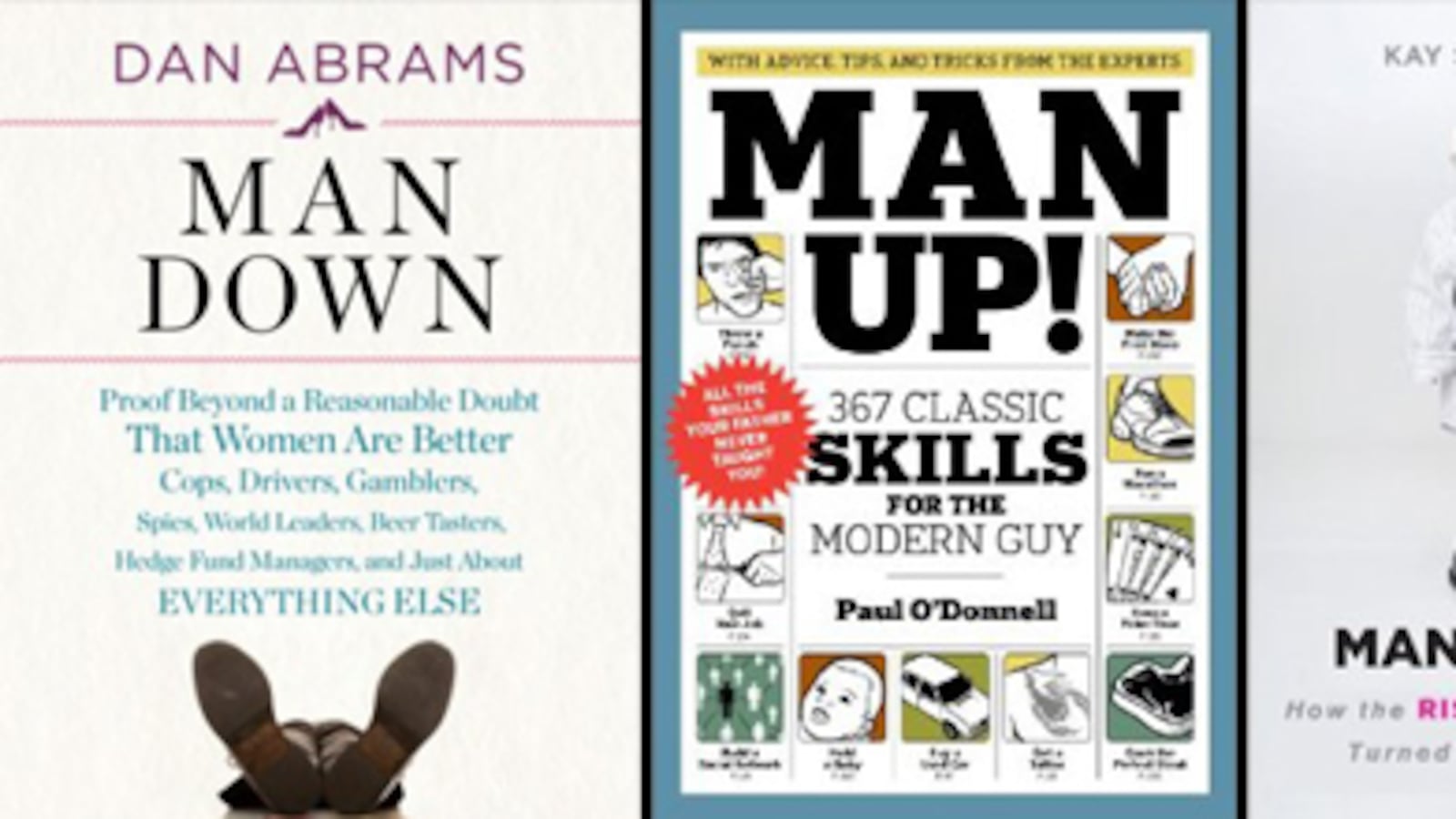Dear men: We're sorry to break this to you, but you're pretty much screwed. In decline, to be exact. Unnecessary, as The Atlantic put it—and overwhelmingly, the victims of the current "Mancession."
We are being facetious, of course. (You're totally not screwed.) But the crisis of manhood has become something of an obsession these days, with belligerent, contradictory, nonstop messages bombarding from every angle. Over the past six months, dozens of articles have used the word "mancession" to describe the current economic downturn. "Retrosexual" has replaced "metrosexual" to describe a breed of über-masculine fashionistos (clad in $300 flannel shirts). And just in case you weren't already confused, there are now three more books to add to the mix, with three more messages to add to your masculinity melting pot.
Luckily, the names are easy to remember. Man Up! screams the title of the first, which promises "367 Classic Skills for the Modern Guy" and answers to questions like, "Do I really need to use conditioner?" ("A guy's coif should not look like he spends forever lingering over it," the book's author warns—followed, comically, by 14 pages of hair grooming tips.) Second is Man Down, written (somewhat oddly) by newly minted ABC legal analyst (and perennial single dude) Dan Abrams, who makes the case that women are "smarter, healthier, and unequivocally better"—in everything from investment banking to remembering things. Finally, we have Kay Hymowitz's Manning Up, which is already churning controversy: Hymowitz argues that women's rise has turned men into "aging frat boys, grubby slackers, and maladroit geeks." Ouch.
Now before your head explodes, there is a basis for each of these theories—and there are plenty of reasons to be thinking critically about manhood. Don Draper may be today's frenzied male icon, but in truth, there were far more men getting chest waxes and Botox treatments this past year than there were those smoking Lucky Strikes. And when it comes to economics, women's rise has indeed been pivotal. Men now lag behind women in the earning of college and advanced degrees; last year, they were surpassed as the majority of the workforce. For young men, the effect is even more dramatic: Women now wait longer to get married and have children—some of them rejecting these notions as a whole (or deciding to go at it alone). And in urban areas like New York and Los Angeles, young, single women are actually out-earning their male peers.


Related Photos: We're an American ManAll of which brings us to Hymowitz's "man-child" theory—guys, she says, are stuck in a stage of perennial boydom ("preadulthood," she calls it) because they see no incentive to get it together. Think Adam Sandler, Seth Rogan, guys who spend Saturday nights drinking beer and playing Halo, while their girlfriends are out earning Ph.D.s. "Why grow up?" they think. There's simply no reason to. "Between his lack of familial responsibilities, his relative affluence, and an entertainment media devoted to his every pleasure, the single young man can live in pig's heaven," Hymowitz writes. Perhaps one of her readers put the sentiment more succinctly: In the modern culture, "Men are disposable."
But this is not the first time men have felt this way—and it certainly won't be the last. "American men have struggled with identity since at least the 19th century," says Hymowitz. As Newsweek put it in 1978, women at work would force men to "revisit their stereotypes." Fifteen years later, as affirmative action flooded women into educational institutions, the magazine lamented that it was a "weird" moment to be a white male. For today's men, though, perhaps the key to modern manhood is more simple: Drown out the white noise.
Plus: Check out Book Beast for more news on hot titles and authors and excerpts from the latest books.
Jessica Bennett is a Newsweek senior writer covering society, youth culture and gender. Her special reports, multimedia packages and original Web video have been honored by the New York Press Club, the Newswomen's Club of New York and GLAAD, among other organizations. Follow her on Twitter.






